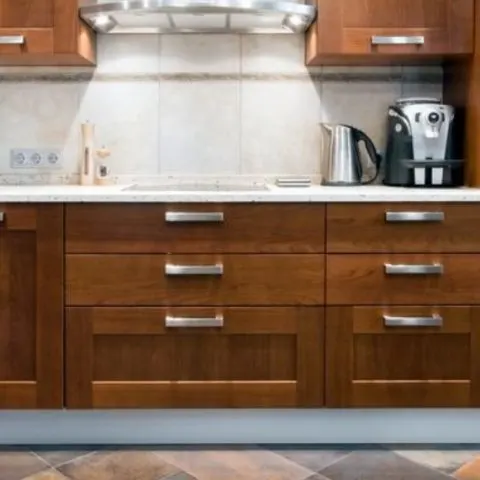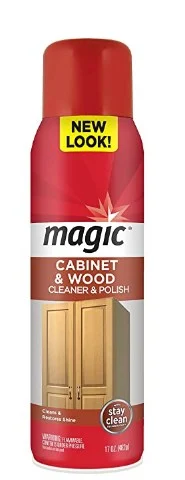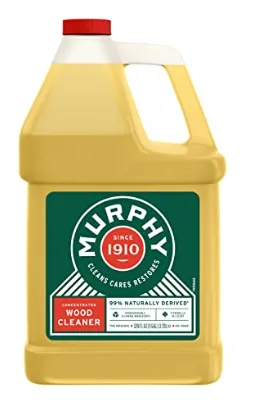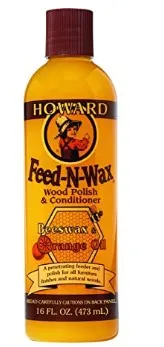Kitchen cabinets get dirty no matter how careful you may be in the kitchen. They also go through a lot of wear and tear. You may intentionally pull and push objects on them, which leads to these tears—the worn-out spots harbors grease, dirt, dust that become difficult to remove.
While cooking foods like you my spill grease on the cabinet. Accumulation of different particles makes your cabinet look dull and seem difficult to clean. But, whether you have painted or finished cabinets, there are perfect items you can use to clean. As you explore these great ways to clean and shine wood cabinets, be careful to avoid damaging the finish.
Cleaning Wood Cabinet
There are various ways you can use to clean your wood cabinets and make them look new again. Some of the items you use can be DIY products, while others are commercial products. Be vigilant while using some of the commercial products and wear protective gear. To ensure your cabinet is always clean, observe this cleaning routine;
- Regularly cleaning- constantly buff your cabinet to get rid of dust. Use a clean, soft cloth on the exterior and interior surfaces of the furniture. Wiping away the dust, especially outside, prevents caking of the grease or steam on the surface.
- Weekly cleaning- clean the spots weekly using a multi-purpose cleaner. Apply the solution on a clean rag and wipe the cabinet to remove the dirt marks on it.
- Seasonally cleaning – you should deep clean your cabinet four to three times a year, depending on the dirt accumulated.
- Empty all the items in the cabinet
- Spray the mild cleaner on the cleaning cloth. Clean the shelves, corners and doors of the cabinet.
- Consider using a toothbrush to remove the dirt in the crevices and corners.
- Dry the cabinet with a clean cloth before restocking.
What You Require
- Vinegar
- Baking soda
- Murphy oil soap
- Wood cleaner
- Cleaning microfiber cloth
- Soft sponge
- Warm water
- Soft brush/ old toothbrush
- Dish soap
Use a Vinegar Solution
- Make a solution of mild vinegar to clean your cabinet and get rid of fingerprints, grease and other kinds of dirt. The mixture should be a 50-50 water and vinegar solution, that is, dilute vinegar. You should avoid using an undiluted or concentrated solution to avoid ruining the wood finish.
- If you don’t have vinegar, you can use a mild all-purpose cleaner that prevents discolouration.
- Dab the cleaning cloth with vinegar and wipe the cabinet surfaces accumulated with dirt. If you soak the fabric in the vinegar, remember to wring it out excess moisture as it may warp the wood.
- Keep rubbing the surfaces with the damp cloth until you get rid of the dirt.
- Dry the cabinets with a clean cloth to avoid destroying the wood.
Check this too: Kitchenaid Ice Maker Troubleshooting and How to Guide
Use Oil Soap Wood Cleaner
The best well-known brand is Murphy’s oil soap. The solution will help get the grime off the wood cabinet if the vinegar solution fails to work. The oil soap is more potent than vinegar and the best product to consider, especially when deep cleaning your cabinets.
- First, test the cleaner on a less visible spot and observe what happens. If the varnish turns white, then don’t use the cleaner and try another mild solution.
- Spray the soap on your cabinet and use a cloth to clean the surfaces in a circular motion. Keep wiping the surface to remove the sticky grease. But remember to avoid rubbing too hard to avoid removing the varnish.
- Use another clean cloth to clear all the grease residue from the cabinet surface. Then dry the cabinet with another clean cloth.
Use Baking Powder
Baking powder paste can help get rid of food splatters or thick caked-on particles. When food particles stay on the surface for a long time, they become difficult to remove. The powder paste acts as a mild abrasive to help in cleaning wood cabinets without removing varnish.
- Make a powder paste by mixing baking soda with enough water.
- Apply the paste to the dirty areas and allow it to sit for 15 minutes.
- You can still consider using a spatula to dislodge the particles while being careful not to scratch the furniture.
- After 15 minutes, use a soft sponge to scrub off the remaining dirt spots.
- Rinse the sponge and repeat the scrubbing as necessary.
- Use a clean, dry material to buff the cabinet dry.
Dish Soap
Some less-hardened greasy areas may only require warm water and soap.
- Soften the dirt on the surface using a sponge that’s damp with warm water.
- Later, soak the sponge in warm soapy water and gently rub it on the dirt to remove it.
- If it’s stubborn, use a soft brush or toothbrush to scrub the grime gently.
- Then wipe the surface with a clean, dry cloth.
Use Polish
It’s best to apply the polish on a clean cabinet to avoid causing a mess. The primary purpose of the polish is to get wooden cabinets to shine again. Choose the best preference for the polish to make your faded cabinet shine.
- Before applying the polish, wipe the cabinet with a clean cloth to remove any dust or caked-on food particles.
- Damp a clean cloth with the polish. Use the material to rub the cabinet surfaces in a circular motion. Make sure the cabinet is uniformly polished.
- Use another clean cloth to buff the surface and remove any excess polish.
- Keep buffing until the cabinet attains a shiny surface and gives the kitchen a lustrous look.
Common Mistakes that Can Damage Cabinets
As you clean your cabinet, you should be aware of the dangers that may arise from using various cleaning products or methods. Therefore, it will help if you practice the following;
- Avoid using too many solutions on the cabinet. The solution seeps into the wood, causing warping.
- Don’t use abrasive products on the wood or scrub too hard.
- Do a test spot cleaning on an inconspicuous spot before applying a product on the entire cabinet, protecting it from potential damage.
- Always use the mildest cleaner on your cabinet.
- Avoid using excess water that runs into the hinges, as it will lead to rusting. Instead of using a dripping cloth, wring it out and use a damp cloth to wipe the cabinet.
- Always dry your cabinet with a clean cloth; leaving it to air dry can damage the finish.
Can You Clean Wooden Cabinets with Baking Soda?
Yes, baking soda is the best in cleaning cabinets with caked-on residue. The powder is non-abrasive thus won’t destroy your wooden cabinet. This product is perfect, inexpensive to use while having stubborn grime on your cabinet. You require to make a baking soda paste and then use a toothbrush or cloth to scrub on the dirt.
How to Clean Dark Wood Cabinets
When cleaning the dark cabinets, you have to be sure you are using safe cleaners. The gorgeous cabinets colour may get lost if you use corrosive or highly-acid or alkaline products. Consider testing the product you choose to use before applying it on the entire cabinet surface. One of the best products you can use on this cabinet is dilute vinegar as a DIY product.
How to make the solution
Use a bottle and fill it with water up to 70%. Then add 30% of vinegar to the bottle. Top up the mixture with 2-4 pumps of dish soap and shake well.
- Apply the solution on a microfiber towel to make it damp.
- Gently wipe the cabinet surfaces to remove dust, fingerprints or smudges present.
- Keep wiping down the surfaces until you get rid of the dirt.
- Later dry the surfaces with a clean cloth.
What is the Best Wood Cabinet Cleaner and Polish?
There are so many commercial products on the market that you can use. But not all cleaners are safe for your wooden cabinet. Below are some perfect wood cabinet cleaners and polish you can consider to clean your cabinet;
Magic wood furniture cleaner and polish
The product best cleans oil-based dirt, thus can remove food stains, dust, cooking grease, etc. The polish is safe for your wooden cabinet and makes maintenance easy. It acts as both a cleaner and polish giving your cabinet a brilliant finishing appearance. Again, its user friendly and maintains the finish of your cabinet.
Features
- It leaves a protecting coating on the wood
- Guards against watermarks
- Leaves no streak
Pros
- It’s a non-abrasive cleanser
- Restores original wood beauty and hides scratches
- Safe to use on all wood surfaces
- Creates a protective coating
Cons
- The nozzles are of poor quality and end up leaking the product.
Murphy’s Oil Soap Original Wood Cleaner
This product has been used by many for the longest time, and it’s worth a trial. The soap works best on wooden cabinets, tile, and linoleum surfaces. The product works best on stubborn grime and residues on wooden surfaces. Again, it’s safe on the wooden cabinet; thus no need to fear while using it.
Features
- 8% of natural derives ingredients.
- Water and coconut included.
- Natural fragrance
- No ammonia
- No bleach.
- 2% of synthetic elements only
Pros
- The cleaner is very effective
- It has a mild scent
Cons
- Lacks disinfecting ability
Howard FW0016 wood polish
The product is fantastic and used on both finished and unfinished wood. It protects the wood from and preserves it from drying out, fading, or even cracking. As a wood polish and conditioner, Howard protects your cabinet, furniture and makes them shine. Again, this product feeds the wood with oils and provides a protective coating of beeswax.
Features
- Easy to wipe on and off.
- Blends out scratches
- Restores colour to faded finishes
- Removes white heat rings
Pros
- Prevents destruction of the wood finish
- Enhances the natural beauty of the grain in the wood
- Polishes all wood surfaces
Cons
- The product is highly flammable, thus making it unsafe to use.
Conclusion
The above methods can help you clean your cabinet make them free of dust, grease, food residue, fingerprints or any stains. After cleaning your cabinet, remember to constantly wipe it with a damp cloth to remove any cleanser residue. Kindly don’t leave your cabinet wet; always dry it with a clean cloth to avoid destroying the wood.




